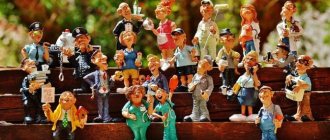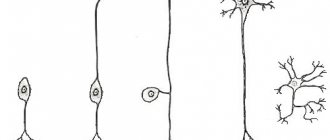People have many statuses and belong to many social groups, the prestige of which in society is not the same. A person looks at the world and treats other people in accordance with his status. The more social roles an individual is able to reproduce, the more adapted to life he is. Thus, the process of personality development often acts as the dynamics of mastering social roles.
A person interacts with different people and social groups every day. It rarely happens that he fully interacts only with members of one group, for example a family, but at the same time he can also be a member of a work collective, public organizations, etc. Entering simultaneously into many social groups, he occupies the corresponding position in each of them. position determined by relationships with other members of the group. To analyze the degree of inclusion of an individual in various groups, as well as the positions he occupies in each of them, the concepts of social status and social role are used.
Status (from Latin status - position, condition) - the position of a citizen.
Social status is usually defined as the position of an individual or group in a social system, which has characteristics specific to this system. Each social status has a certain prestige.
All social statuses can be divided into two main types: those that are prescribed to the individual by society or a group, regardless of his abilities and efforts, and those that the individual achieves through his own efforts.
Concept
Social status is a position in the social structure. The term is used in 2 meanings:
- The social status of an individual is a person’s position in society, in the system of social and interpersonal relations. It is reflected in the internal position (values and orientations, motivations), in external appearance, speech culture, jargon.
- The social status of a group is the place occupied by the group in the social hierarchy. Status groups are characterized by a specific system of values, norms of behavior, a certain lifestyle, type of education and occupation.
The concept includes:
- assessment by an individual or a group of their place in the social hierarchy;
- public assessment of the activities of an individual or group.
Social status is determined by socially significant characteristics :
- natural – ethnic, age, gender;
- economic – property and financial status, lifestyle;
- social settlement – city dwellers, rural residents;
- set of rights, obligations, functions;
- place in the hierarchy of political relations - possession of power, activity in political groups, organizations, movements;
- place in the division of labor system - education, type of employment, profession, qualifications;
- prestige - the social significance of a position occupied in society.
The combination of all these characteristics determines social position .
The system of social statuses forms the laws of interaction (rights and obligations, hierarchy of subordination) of individuals and groups.
Financial situation and social characteristics of youth in the region: sociological analysis
Thus, when assessing such a way to improve their financial situation as “getting into an arranged marriage,” 18.4% of low-income youth surveyed rated it as “normal,” while among wealthy youth only 10.9% of respondents gave this assessment. This method of receiving money is considered “unworthy under any circumstances” by 39.8% of low-income youth and 46.9% of wealthy youth.
The first group is young people whose average monthly income per family member is less than 8,000 rubles - low-income people. The second group is young people whose income ranges from 8,000 to 24,000 rubles per family member - the middle-income ones. And the third group is young people whose income is more than 24,000 rubles per family member - wealthy people.
What's happened
The concept of social status determines the position occupied and also reflects the hierarchical structure of the entire group. Status characteristics do not entirely depend on the efforts made by the individual; they are determined by the surrounding society, endowing or depriving them of certain functions based on not always objective factors. It is worth noting that the social status occupied is not a static concept and changes in accordance with external circumstances or by a decision made by the person himself. Also, the status may cease to exist completely if a person leaves a given social group or ceases to build his activities on the basis of the rules that govern the behavioral manifestations of people.
Increasing social status is possible with a person’s independent efforts and aspirations (obtaining additional education, creating a social movement, increasing the number of orders carried out), as well as due to social processes (military conflicts, change and seizure of power, death of superiors).
The statuses of one person are divided into personal and social-public, which is determined by the person’s inclusion simultaneously in social groups of various sizes. Personal status includes the place a person occupies in a small group (family, immediate peer group, team, etc.). The position held here is regulated by personal qualities and the ability to build strong and productive interpersonal connections. The better a person is perceived by others, the more positive emotions they experience in his direction, the higher his status. It is quite simple to adjust your place in a small group; it is characterized by frequent changes in positions, which is largely determined by the emotionality of perception and reflects relationships and their processes.
The social status of a person refers to the place he occupies in a large group of people, distinguished on the basis of certain categories (gender, nation, religion, profession, place of residence, etc.). The perception of personality qualities and characteristics at this level is regulated not by the group of people themselves and their influence, but by the global position of this social category in society. It is the lack of flexibility in this matter and the scale of perception that explains the derogatory attitude based on their race, the oppression of rights and freedoms based on gender characteristics and religious preferences.
Cruelty
If you think about it, the socially dangerous situation of children and families is very common. Only many try to hide it. For example, abuse of children and family members is a factor indicating danger.
For example, domestic violence in the family. This can be either the use of physical force in any of its forms (even for educational purposes), or the belittlement of human dignity, psychological tyranny, submission. This also includes abuse of parental rights. This is usually seen in relation to minor children.
Domestic abuse will be punished. Most likely, the culprit will be judged based on the Criminal Code of the Russian Federation. In such situations, the following articles apply: “Beatings”, “Intentional harm to health”, “Torture”. The list can go on for a long time. But in such a situation, the perpetrator will most likely be sentenced to imprisonment for up to 3 years. It is becoming more and more difficult to identify social disadvantage in society due to abuse. So-called tyrants try not to show themselves in order to avoid punishment.
Kinds
Each person, as a rule, has not one, but several social statuses. Sociologists distinguish:
- natural status
is the status received by a person at birth (gender, race, nationality). In some cases, birth status may change: the status of a member of the royal family is from birth until the monarchy lasts. - acquired (achieved) status
- a status that a person achieves through his own efforts (position, post). - prescribed (attributed) status
- a status that a person acquires regardless of his desire (age, status in the family); it can change over the course of life. The prescribed status is either innate or acquired.
Basic
Innate is a status assigned to a person from birth, determined by biological factors. It does not depend on a person’s personal qualities and desires. This is gender, nationality, race. For example, Mongoloid characterizes a race. Woman is a characterizing gender. Ukrainians are the defining nationality.
The abdication of the royal family from the throne will lead to the loss of the royal title. In this situation, the inherent status may change.
Prescribed - acquired by an individual, regardless of his desire, but due to a combination of certain circumstances. This could be age, family wealth, blood ties between father and mother, brother and sister. Over time, the prescribed status changes, for example, when a schoolchild reaches the age of majority or the age of retirement.
Achieved - this status is associated with the efforts and zeal of a person, which he made during his life to obtain education, material and non-material benefits. For example, it can be defined:
- title (Miss Russia, labor veteran);
- scientific degree (Doctor of Science, Candidate of Science);
- position (president, leading specialist);
- qualifications (people's teacher, honored master of sports).
Thanks to the achieved status, a lot can be said about a person, about his personal qualities, about the desire to achieve high results and be realized as an individual.
Amounts and types of financial assistance from social security in 2021
In some cases no assistance is provided. For example, if the family has one or more able-bodied members, but they do not want to work. The only exceptions are the following cases:
Families of pensioners (in which there are no able-bodied members) or single elderly people can receive targeted assistance for repairs in residential premises. Its amount is up to 15,000 rubles, and it is paid on the basis of an inspection report of the premises or a certificate of a fire or flooding that occurred in it. It is possible to transfer assistance upon completion of the work; then it is necessary to submit receipts, estimates and original documents confirming payment for the services of construction and repair organizations.
What are there
Any person has several social statuses. All characteristics form a single image of an individual. The main thing remains the position that gives a person power and depends on his wealth and financial well-being.
The social status that a person is born with is called innate, and determined by family ties is called ascribed. They do not depend on a person’s actions and will appear to him in any case.
Due to differences in birth status, people have different rights, which determines inequality in society, dividing it into classes. Often this affects a person’s adaptability to the surrounding reality, his skills and desire to achieve his goals. People with higher inherent and ascribed status tend to be better off in life. But this does not negate perseverance, hard work and talent, which can change one’s position in the social hierarchy. Skills and abilities acquired through one's own labor are valued more than wealth or manners attributed to family ties.
Innate, assigned and achieved are the main types into which social statuses are usually divided.
The main indicators that determine the place and role in society are:
- Position held: director or leading specialist, head of department, chief accountant;
- Received rank. In the creative profession, this is an Honored or People's Artist. In the service, achievements are determined by military rank: lieutenant or lieutenant colonel. Public sector workers are also noted, for example, an honored teacher;
- Academic degree, for example, bachelor, master, candidate or doctor of science.
master
Note! Status obtained as a result of an individual's merit is considered acquired or achieved. It was created through our own efforts and is a reward for work. The main thing is to set a goal and go towards it, then the acquired status will make you forget about the position assigned to a person from birth.
A person always has unstable statuses, depending on his role in life and circumstances:
- he can be a husband and father of children;
- act as a witness or spectator;
- be a patient or a doctor.
These are all temporary social statuses that are not related to the main thing. Small social groups and an individual’s close circle endow him with certain qualities, creating personal status. It reflects an opinion formed about a person, depending on behavior. There is a concept of group social status, which presupposes belonging to a profession or a nation.
Elderly people are also considered a separate social group. Meanwhile, the status of pensioners varies. It depends on the benefit received, and it, in turn, is determined by the level of income and length of service. High social status is required to ensure a decent income in old age.
Financial situation of young people
Noting positive changes in the self-identification of young people according to the level of their financial situation, one should take into account the peculiarities of the formation of social strata in modern Russian society. The concepts of average and above average wealth, as well as the concept of the middle class, have their own specifics and are practically not comparable with similar strata and the structure of opportunities for similar strata in economically developed societies. This conclusion is confirmed by a comparison of self-identification by standard of living with self-assessment of the frequency of material difficulties experienced, as discussed above. The unsatisfactory financial situation of young people, the gap between rising prices and incomes, which gives rise to contradictions in social status, is evidenced by the following fact: in 2021, young people rated their financial status higher, but at the same time the share of those in need among them also increased. These contradictions are of an institutional nature and are associated with the consequences of the deep economic crisis that have not yet been overcome.
This is interesting: How to correctly write an application to school for family reasons
The level of financial situation of young people is reflected in their subjective feelings of self. Subjective assessments of financial situation are manifested in the correlation of oneself with various income groups. This indicator is one of the most unstable. It depends both on real changes in the income of young people and on individual perceptions of well-being. For example, in the 1990s. A wide layer of poor and low-income youth was formed, to whom only essential products and some durable household items were available. At the same time, a small middle layer of young people gradually emerged, which by the end of the 1990s. accounted for approximately 15% of all youth and about 3% of rich youth. The August 1998 default significantly undermined the position of the emerging middle class, reducing its youth component by half. Further policies of socio-economic stabilization had a positive impact on this indicator. As a result, the proportion of young people who feel destitute, poor and low-income has decreased. At the same time, the number of young people with average and above average income has increased. The share of wealthy young people remained at the same low level.
Social roles
While in one status or another, a person performs actions, communicates with other people, that is, plays a role. Social status and social role are closely interrelated, but differ from each other. Status is a position, and a role is socially expected behavior determined by status. If a doctor is rude and swears, and a teacher abuses alcohol, then this does not correspond to the status he holds.
The term “role” was borrowed from theater to emphasize the stereotypical behavior of people of similar social groups. A person cannot do as he wants. The behavior of an individual is determined by the rules and norms characteristic of a particular social group and society as a whole.
Unlike status, a role is dynamic and closely related to a person’s character traits and moral attitudes. Sometimes role behavior is adhered to only in public, as if putting on a mask. But it also happens that the mask fuses with its wearer, and the person ceases to distinguish between himself and his role. Depending on the situation, this state of affairs has both positive and negative consequences.
Social status and social role are two sides of the same coin.
Types of social role
generally accepted system of social roles was developed by the American sociologist Talcott Parsons.
He divided types of roles according to four main characteristics:
Reasons for the generation gap
Young people and teenagers are often offended by the older generation for the many prohibitions and restrictions imposed on them. Psychologists call this a breakdown of connections between generations. But when parents forbid teenagers from watching TV, playing computer games, drinking alcohol, or staying in the company of friends, they are simply fulfilling their social roles. Parents are strict not out of harshness or lack of love towards their children, but out of duty towards them.
Teenagers dream of growing up faster, they promise themselves never to act in the same way towards their future children, they dream that when they become adults, they will allow their children to do whatever they want. But having matured, teenagers change their view of the world and, having become parents, also show some severity towards their children. The problem of a breakdown in communication between generations leads to a lack of mutual understanding between older and younger ones. To fix this, everyone needs to try to put themselves in the other’s place.









